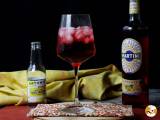Non-alcoholic wine: the new trend that is revolutionizing the wine world

In recent years, non-alcoholic wine has gained more and more space in the global market, attracting the interest of wellness-conscious consumers and new trends. This alternative to traditional wine allows people to enjoy the sensory experience of wine without the effects of alcohol, meeting the needs of those who adopt a healthier lifestyle or choose to avoid alcohol for personal, religious or professional reasons. But what exactly is nonalcoholic wine and how is it produced? Find out in this article!
How is non-alcoholic wine produced?
To best understand this new trend, let's start with the basics. One of the most frequently asked questions is: how is nonalcoholic wine produced?
As Marcello Leder explains on quattrocalici.it, the process begins with traditional winemaking, in which grapes are fermented to make wine. Next, the alcohol is removed through specific techniques, such as vacuum distillation and reverse osmosis. Vacuum distillation allows the alcohol to be removed by evaporating it at low temperatures, thus preserving the wine's original aromas and characteristics. Reverse osmosis, on the other hand, uses a semi-permeable membrane to separate the alcohol from the water and other components, ensuring a result more faithful to traditional wine.
Global non-alcoholic wine trend
The non-alcoholic wine market is expanding rapidly. According to a Euronews report, the global value of this sector will grow from the current €8 billion to €14 billion by 2030 in Europe. This growth is fueled by a change in consumer habits, with increased demand for low or no-alcohol beverages. In particular, Millennials and Generation Z are driving this trend toward healthier choices.
As evidence of this trend, the first wine shops dedicated exclusively to non-alcoholic wines are emerging. In the heart of Bordeaux, the cradle of world viticulture, "Belles Grappes," a boutique focused entirely on non-alcoholic wines, has opened. This concept, which until recently would have seemed almost heresy in a city symbolic of traditional wine, is gaining considerable interest. Anne Kettaneh, co-owner with her husband Alexandre, tells of a steady stream of curious people and producers visiting the store to learn more about this new market (source: ).
Non-alcoholic wine production also starts in italy
In Italy, after years of debate, the use of the designation "wine" was recently authorized for beverages with an alcohol content of less than 8.5 degrees. With the publication on the website of the Ministry of Agriculture of the implementing provisions of the decree on dealcolated wines, a regulatory gap is overcome and a taboo in the world's largest wine-producing country falls. Ministerial Decree No. 672816 of Dec. 20, 2024, signed by Agriculture Minister Francesco Lollobrigida, allows Italian producers to make and market alcohol-free wines in accordance with EU Regulation 1308/2013. However, this possibility does not apply to protected designation of origin (PDO) and protected geographical indication (PGI) wines, for which the dealcolation process remains prohibited (source: ilsole24ore).
Does non-alcoholic wine taste the same as traditional wine?
Non-alcoholic wine does not taste exactly the same as conventional wine. The removal of alcohol can affect the taste and structure of the wine, often making it lighter and with different aromatic notes than the conventional version. Alcohol, in fact, plays a crucial role in carrying aromatic substances and imparting body to the wine. Its absence can lead to a beverage perceived as less robust and with a less complex flavor profile. In addition, the perception of flavor may vary depending on the method used for dealcoholisation and the quality of the starting wine. According to the San Francisco Chronicle, many producers are investing in advanced technologies to preserve as much of the wine's original characteristics as possible, offering nonalcoholic alternatives that are increasingly closer to the traditional taste.
What is your experience with non-alcoholic wine?
What about you, have you tried non-alcoholic wine yet? We are curious to know what you think about it! Were you surprised by its taste? Do you consider it a viable alternative to traditional wine? Share your experience in the comments: tell us which brand you tasted, on what occasion you drank it, and whether you recommend it. The debate is open, and your opinions are valuable!
You might also be interested in:
 Daniele Mainieri
Daniele Mainieri

Comments